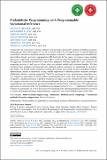| dc.contributor.author | Becker, McCoy R. | |
| dc.contributor.author | Lew, Alexander K. | |
| dc.contributor.author | Wang, Xiaoyan | |
| dc.contributor.author | Ghavami, Matin | |
| dc.contributor.author | Huot, Mathieu | |
| dc.contributor.author | Rinard, Martin C. | |
| dc.contributor.author | Mansinghka, Vikash K. | |
| dc.date.accessioned | 2024-07-09T15:51:27Z | |
| dc.date.available | 2024-07-09T15:51:27Z | |
| dc.date.issued | 2024-06-20 | |
| dc.identifier.issn | 2475-1421 | |
| dc.identifier.uri | https://hdl.handle.net/1721.1/155517 | |
| dc.description.abstract | Compared to the wide array of advanced Monte Carlo methods supported by modern probabilistic programming languages (PPLs), PPL support for variational inference (VI) is underdeveloped: users are typically limited to a small selection of predefined variational objectives and gradient estimators, which are implemented monolithically (and without explicit correctness arguments) in PPL backends. In this paper, we propose a modular approach to supporting VI in PPLs, based on compositional program transformation. First, we present a probabilistic programming language for defining models, variational families, and compositional strategies for propagating gradients. Second, we present a differentiable programming language for defining variational objectives. Models and variational families from the first language are automatically compiled into new differentiable functions that can be called from the second language, for estimating densities and expectations. Finally, we present an automatic differentiation algorithm that differentiates these variational objectives, yielding provably unbiased gradient estimators for use during optimization. We also extend our source language with features not previously supported for VI in PPLs, including approximate marginalization and normalization. This makes it possible to concisely express many models, variational families, objectives, and gradient estimators from the machine learning literature, including importance-weighted autoencoders (IWAE), hierarchical variational inference (HVI), and reweighted wake-sleep (RWS). We implement our approach in an extension to the Gen probabilistic programming system (genjax.vi, implemented in JAX), and evaluate our automation on several deep generative modeling tasks, showing minimal performance overhead vs. hand-coded implementations and performance competitive to well-established open-source PPLs. | en_US |
| dc.publisher | Association for Computing Machinery | en_US |
| dc.relation.isversionof | 10.1145/3656463 | en_US |
| dc.rights | Creative Commons Attribution | en_US |
| dc.rights.uri | https://creativecommons.org/licenses/by/4.0/ | en_US |
| dc.source | Association for Computing Machinery | en_US |
| dc.title | Probabilistic Programming with Programmable Variational Inference | en_US |
| dc.type | Article | en_US |
| dc.identifier.citation | Becker, McCoy R., Lew, Alexander K., Wang, Xiaoyan, Ghavami, Matin, Huot, Mathieu et al. 2024. "Probabilistic Programming with Programmable Variational Inference." Proceedings of the ACM on Programming Languages, 8 (PLDI). | |
| dc.contributor.department | Massachusetts Institute of Technology. Department of Electrical Engineering and Computer Science | |
| dc.contributor.department | Massachusetts Institute of Technology. Computer Science and Artificial Intelligence Laboratory | |
| dc.relation.journal | Proceedings of the ACM on Programming Languages | en_US |
| dc.identifier.mitlicense | PUBLISHER_CC | |
| dc.eprint.version | Final published version | en_US |
| dc.type.uri | http://purl.org/eprint/type/JournalArticle | en_US |
| eprint.status | http://purl.org/eprint/status/PeerReviewed | en_US |
| dc.date.updated | 2024-07-01T07:59:39Z | |
| dc.language.rfc3066 | en | |
| dc.rights.holder | The author(s) | |
| dspace.date.submission | 2024-07-01T07:59:40Z | |
| mit.journal.volume | 8 | en_US |
| mit.journal.issue | PLDI | en_US |
| mit.license | PUBLISHER_CC | |
| mit.metadata.status | Authority Work and Publication Information Needed | en_US |
